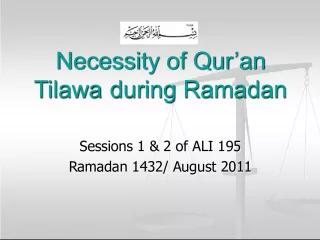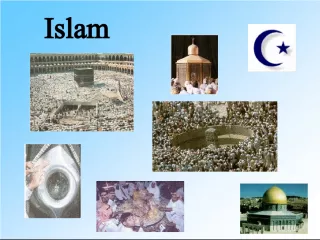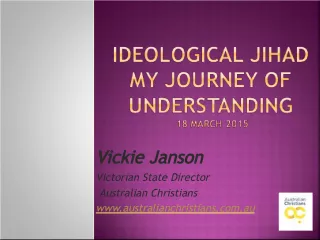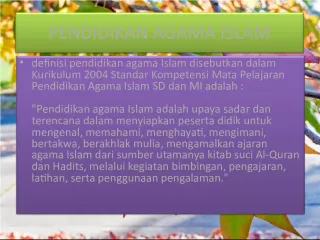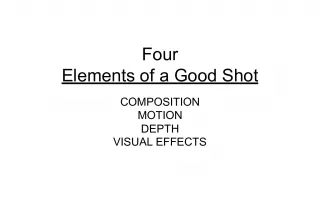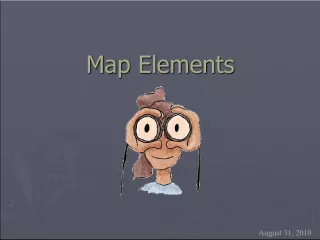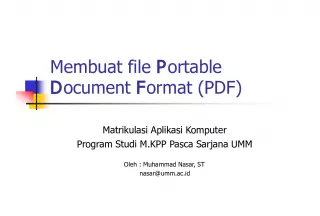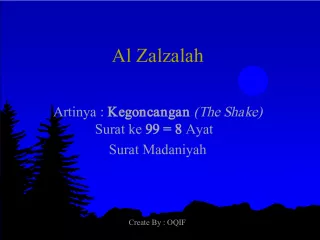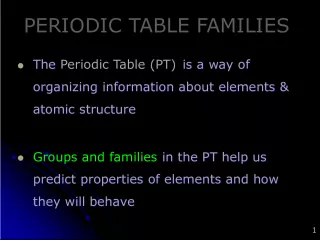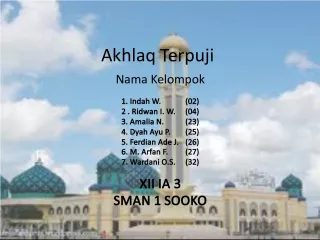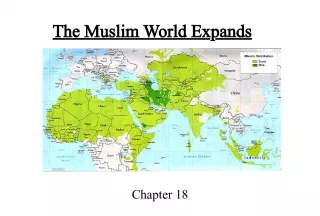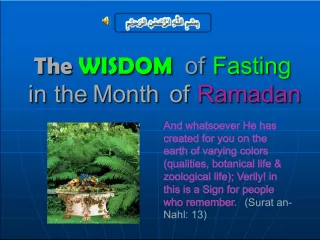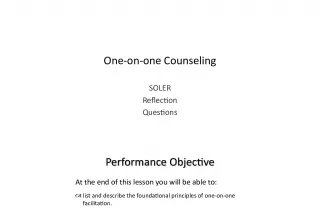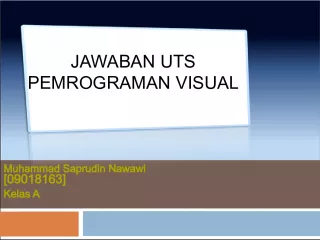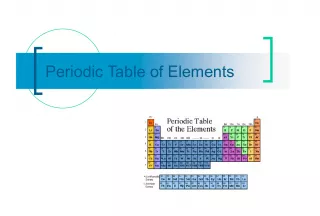Muhammad and the Quran: The Foundational Elements of Islam
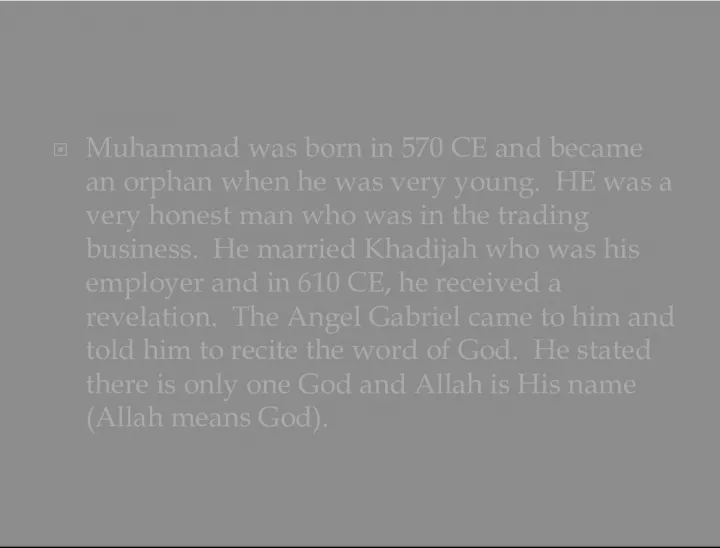

This article provides an overview of the life of Prophet Muhammad and the significance of the Quran as the sacred text of Islam. It covers his early life, marriage, and the revelation he received from the Angel Gabriel. It also explains the importance of reading the Quran in its original Arabic form to understand God's message.
- Uploaded on | 0 Views
-
 whitley
whitley
About Muhammad and the Quran: The Foundational Elements of Islam
PowerPoint presentation about 'Muhammad and the Quran: The Foundational Elements of Islam'. This presentation describes the topic on This article provides an overview of the life of Prophet Muhammad and the significance of the Quran as the sacred text of Islam. It covers his early life, marriage, and the revelation he received from the Angel Gabriel. It also explains the importance of reading the Quran in its original Arabic form to understand God's message.. The key topics included in this slideshow are Muhammad, Quran, Islam, Arabic, Surahs,. Download this presentation absolutely free.
Presentation Transcript
1. Muhammad was born in 570 CE and became an orphan when he was very young. HE was a very honest man who was in the trading business. He married Khadijah who was his employer and in 610 CE, he received a revelation. The Angel Gabriel came to him and told him to recite the word of God. He stated there is only one God and Allah is His name (Allah means God).
2. The Sacred text of Islam is called the Quran which means recitation. The only way to truly know God is to be able to read the Quran in Arabic. Quran is often spelt, KORAN as well. It is made up of Surahs or chapters.
3. Shariah is defined as Islamic law. It is based on the Quran and on the Sunnah (or teachings and examples of the prophet). Muslim countries base the whole legal system on Shariah, meaning, when in a Muslim country you need to follow their Religious laws.
4. Mecca: The city where Muhammad was born and also the home of the sacred shrine of the Kaba (cube)
5. Medina (originally called Yathrib): The city that Muhammad immigrated to after being forced to leave Mecca. This event is called the hijra (migration) which took place in 622 CE. Medina means city of the prophet. Muslims date their calendar based on the hijra.
6. Jerusalem: It is here that Muslims believe Muhammad rose to Heaven on a winged horse. A very important Mosque stands in the spot where he ascended. That mosque is called the Dome of the Rock.
7. Muslims believe that Muhammad went with the Angel Gabriel on a winged horse to Jerusalem. Once there, the Angel Gabriel and Muhammad went up to heaven where they saw; Adam, John and Jesus, Joseph, Moses, Abraham and then Allah Himself.
8. Sunnis: Muslims who believe in following the person best suited to lead the Muslim community. This is the largest group of Muslims. Shiahs (sometimes called Shiites): This group believed that the leader of the community should be a relation of Muhammad. Sufis: This is the mystical type of Muslim. The word means wool wearer. The most famous type of Sufi are the Whirling Dervishes.
9. 1. Creed: The Muslim creed is the shahada and it states: There is no God but Allah, and Muhammad is the messenger of Allah. 2. Prayer (salat): Muslims must pray five times a day and they face Mecca when they do so. Men and women pray separately. Can you figure out why? La ilaha illLlah. Muhammadun rasuluLlah.
10. 3. Almsgiving (Zaka(t)): Muslims are required to help those in their community who are less fortunate than they are by giving a certain percentage of what they earn. 4. Fasting during the month of Ramadan (Sawm): During the Muslim month of Ramadan Muslims are to abstain from food, water, evil thoughts, drinking, smoking and sex during the daylight hours.
11. 5. Pilgrimage (Hajj): At least once in a life time, all Muslims are required to go on a pilgrimage to Mecca where they were to perform a number of different rituals including circling the Kaba (7 times, counter clockwise). As well as circling the Kaba, on the last day, pilgirms throw seven pebbles at three tall stone pillars that represent Satan and Idolatry. Tents in Mecca during the Hajj
12. Two Festivals of importance: 1. Eid al-Fitr (the little feast): A feast celebrating the end of Ramadan 2. Eid ul-Adha (the major or big feast): This feast takes place during the month of the hajj and it recalls the testing of Abraham by God to sacrifice his son. Eid greeting card Meal to end the fast
13. A place of worship in Islam is called a Mosque The community of Muslims is called the Umma The person who leads people in prayer is called an imam
14. 1. Adam: The Chosen of God
15. 2. Noah: The Preacher of God
16. 3. Abraham: The Friend of God
17. 4. Moses: The Converser with God
18. Jesus: The Spirit of God Regarding Jesus, Muslims believe He was born of the virgin, Mary. They also believe He will come back to Earth to judge the living and the dead. They do not believe He died on a cross nor do they believe He rose from the dead
19. Muhammad: The Seal of the Prophet Read! In the name of thy Lord and Cherisher; Who Created man out of a mere clot of congealed blood: Proclaim! And thy Lord is Most Bountiful. He Who taught the use of the Pen taught man that which he knew not. Quran: 96:1-5
20. Traditionally, the umma gather together to worship in the Mosque on Friday. After Prayer, the imam gives a sermon that shows how the Quran can be applied to everyday life.
21. On the whole, the Quran itself, and the ideals of Islam, regard men and women as equals, but with different roles. For example, men usually have predominant roles in economic and public life and women have greater influence within the family. The Quran states, You may marry other women who seem good to you: two, three, or four of them. But if you fear that you cannot maintain equality among them, marry one only. (Quran 4:3) Because Muhammad wanted women to be treated better, he said they should wear modest clothing that hid their shape so they would be respected for their inner beauty and not just their outer beauty, that they would be seen for who they are not what they are. The Quran also states, If you ask the prophets wife (wives) for anything, speak to them from behind a curtain. (Quran 33:53) Some Muslims require that women cover every part of their body, and hide their face behind a veil. Others define veiling simply as covering the hair while in public. Information taken fromWorld Religions a voyage of Discovery by Jeffrey Brodd
22. Jihad literally means exertion or struggle. On the personal level, it refers to the individuals spiritual struggle against anything that detract from being a good Muslim. In a narrow context, it refers to armed struggle and is sometimes thought of as meaning holy war. The Quran only supports armed struggle for the sake of Islam only if it is done in self-defense. Muslims also believe in fate or Kismet.
23. Calligraphy comes from two Greek words meaning Beauty and Writing. Therefore Calligraphy means: Beautiful Writing.
25. Malcolm Little was man who had a tough childhood, his dad died when he was very young and his mother was put in a mental institution. He became a drug addict and petty thief. In 1946, at age 20, he went to prison for larceny and breaking and entering. While in prison he became a member of the Nation of Islam , and quickly rose to become one of its most important and influential leaders. By March 1964 Malcolm X had grown disillusioned with the Nation of Islam and its head Elijah Muhammad , and broke away starting his own group based more on true Muslim teachings. He stated that the teachings of racism of the Nation of Islam was wrong at said "I did many things as a [Black] Muslim that I'm sorry for now. I was a zombie then ... pointed in a certain direction and told to march". [2] In February 1965, shortly after repudiating the Nation of Islam, he was assassinated by three of its members .
